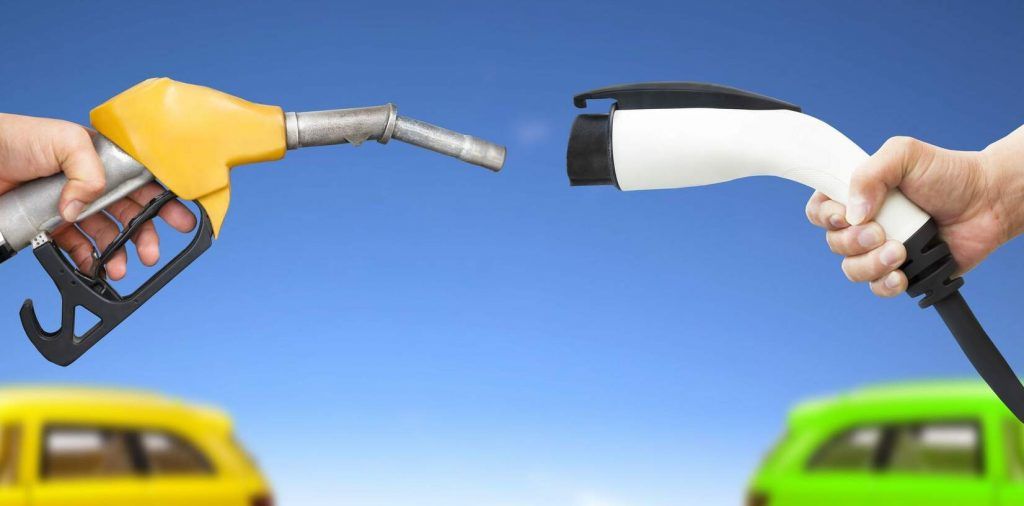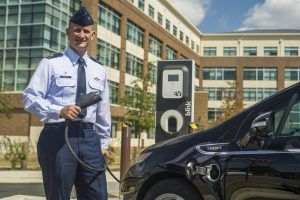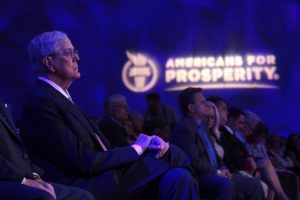How the Koch brothers got us here
By Ben Jervey | September 26, 2019
 Gas cars facing off against electric cars. Image courtesy Electrek
Gas cars facing off against electric cars. Image courtesy Electrek
This story originally appeared in DeSmog. It is republished here as part of the Bulletin’s partnership with Covering Climate Now, a global collaboration of more than 300 news outlets to strengthen coverage of the climate story.
If it feels like the oil industry’s attacks on the burgeoning electric car market are well-coordinated, that’s because they are. The industry is following a blueprint laid out decades ago, and refined ever since, by Koch network insiders.
In a revelatory article, published in Philanthropy Magazine in 1996, an executive vice president of Koch Industries named Richard Fink laid out a three-tiered integrated strategy for promoting libertarian ideals and free-market principles, and, in doing so, protecting the Kochs’ sprawling petrochemical refining and shipping businesses.
Fink, who also led the Charles Koch Foundation, described the strategy for investing the Kochs’ fortunes through grants and financial support to organizations and individuals at different stages of policy development and implementation, from universities to think tanks to advocacy groups—all of which, in Fink’s words, “present competing claims for being the best place to invest resources.” Rather than prioritize grantmaking to one of these levels, the Koch network has invested heavily in all three.
Describing this “Structure of Social Change,” Fink writes:
“At the higher stages we have the investment in the intellectual raw materials, that is, the exploration and production of abstract concepts and theories. These still come primarily (though not exclusively) from the research done by scholars at our universities …
In the middle stages, ideas are applied to a relevant context and molded into needed solutions for real-world problems. This is the work of the think tanks and policy institutions …
But while the think tanks excel at developing new policy and articulating its benefits, they are less able to implement change. Citizen activist or implementation groups are needed in the final stage to take the policy ideas from the think tanks and translate them into proposals that citizens can understand and act upon.”
Today, as the federal and state governments consider their roles in accelerating adoption of electric vehicles (EVs), particularly in light of the climate crisis, we can see the effectiveness of these investments play out in the public policy debates.
Whether through highly-coordinated attacks on the federal EV tax credit or interventions in arcane proceedings in state public utility commissions— and through public and covert efforts to spread disinformation—the beneficiaries of the Kochs’ strategic funding are working to slow the transition to zero-emission, plug-in vehicles, effectively preserving the market demand for the refined petroleum products the Koch empire is selling.
Academia: The “intellectual raw materials” for the EV fight. The Koch network has spent decades investing in colleges and universities, often times funding faculty positions or free market centers and programs and staffing them with ideologically aligned academics. In recent years, this funding has come under considerable scrutiny, and much has been reported on the strings attached to funding of programs like the Mercatus Center at George Mason University, the Center for Growth and Opportunity at Utah State University, and the Department of Economics at Florida State University.
By design, this is an “investment in the intellectual raw materials,” as Fink wrote, “that is, the exploration and production of abstract concepts and theories.”
The abstract nature of such academic exploration makes it a little harder to see the impact of the Koch network’s investments in universities on a single policy issue as discreet as transportation electrification. But not impossible.
Indeed, some of the Kochs’ chosen academics and Koch-funded centers have spoken publicly to the issue.
One of the most visible academic figures arguing against the federal EV tax credit is Veronique de Rugy, a senior research rellow at the Mercatus Center. Last fall, as Congress considered a couple of opposing bills—a bipartisan proposal to extend the tax credit and another to cancel it—de Rugy railed against the tax credit in an op-ed.
It’s worth noting that the bill to eliminate the credit was introduced by Senator John Barrasso of Wyoming, the third-largest recipient of Koch Industries donations in the Senate, and that Koch Industries formally lobbied for Barrasso’s bill. De Rugy wrote that “Barrasso’s proposal makes the tax code simpler and less distortionary, making it the most economically sound.”
Earlier this year, de Rugy wrote another op-ed bashing the bipartisan support for the federal EV tax credit, and describing the consumer tax incentive as a “corporate handout.”
Another Mercatus Center economist, Matthew Mitchell, publishes frequently on the subjects of government favoritism and privilege, making the popular free-market argument that the government shouldn’t support private industries through fiscal policies like tax preferences, loan guarantees, and direct subsidization.
Curiously, Mitchell never writes of the massive subsidies enjoyed by the mature oil and gas industries, which the US treasury has calculated out to $4.7 billion per year. Nor does he take issue with the more than $500 million that Koch Industries itself—the second-largest private company in the United States—has benefited from over the past two decades, according to the Subsidy Tracker built by Good Jobs First. Mitchell does, however, use Tesla as a “beautiful illustration of the problem of favoritism and crony capitalism” in a video he narrates for the Federalist Society, and in a number of related articles.
It’s more common for Koch-funded academics to influence the EV policy discussion indirectly, through the “abstract concepts and theories” that Fink described or through other related issues.
The gasoline tax provides a good example. The Koch network opposes any increase to federal or state gas taxes, for obvious reasons—the taxes would make Koch Industries’ refined petroleum products more expensive (and make alternatives like mass transit and electric cars more attractive). However, gas taxes typically fund roads, and gas tax revenues are dwindling as they haven’t kept pace with inflation and cars have gotten far more fuel efficient.

The Koch network is actively pushing the argument that electric vehicles, which don’t pay a gas tax, are to blame for highway funding shortfalls, despite vast evidence to the contrary. Some states have enacted special EV fees to bolster highway funds, and Senator Barrasso is spearheading an effort to create a new fee at the federal level. This despite a recent report by Consumer Reports which found that the majority of these fees are punitive in that they charge plug-in drivers more than the equivalent that gas-powered cars would generate in gas taxes annually.
Even so, some Koch-funded academics have argued recently against raising gas taxes, while taking shots at electric cars. Writing in the Orange County Register last year, a professor and research fellow from Utah State University’s Koch-funded program claim: “The decline in gas-tax revenue caused by the shift away from internal-combustion engines is stressing the highway trust funds in many states,” adding that some states now “charge special fees for electric-car owners to compensate for the lost revenue.”
Similarly, in a recent op-ed in Forbes, Adam Milsap, the associate director of the Koch-funded L. Charles Hilton Jr. Center for the Study of Economic Prosperity and Individual Opportunity at Florida State University, writes that “the gas tax is not the long-term funding answer” for road funds. While Milsap doesn’t promote a fee for EVs, he does portray them as a growing part of the problem. Milsap is, to borrow Mitchell’s phrase, “a perfect illustration” of the Koch-funded higher ed ecosystem.
In a 2014 panel on “Leveraging Science and the Universities” at the Koch Freedom Partners donor summit session, Milsap described how Koch-funded programs—like George Mason University’s Mercatus Center, and the Institute for Humane Studies—trained him to cultivate a “new talent pipeline” for all levels of the Koch network. He also described how academics should use all “viable mediums,” including “major Republican blogs, op-eds, and policy briefs” to spread ideas to a broader, more popular audience, as he regularly does on Forbes and in other outlets.
Think tanks: Translating free market Ideas to EV antagonism. Fink described the role of think tanks as translating ideas into actual solutions and policy proposals. Here, at this stage, “ideas are applied to a relevant context and molded into needed solutions for real-world problems.”
The role that think tanks and policy institutions play in fighting against EV-friendly policies cannot be overstated, as they develop and push deceptive talking points about electric cars into the public policy debates, and even produce reports and so-called “studies” that cherry-pick data to promote a burn-more-gas agenda.
As Elliot Negin of the Union of Concerned Scientists wrote, “these think tanks and advocacy groups essentially function as public relations arms for their benefactors, representing their interests under the guise of being neutral, albeit conservative, policy shops.”
Negin references a September 2018 letter, which DeSmog also reported extensively on, that reveals the breadth of the Koch think tank influence in the debate over the federal EV tax credit. The letter, signed by 30 self-described “conservative free-market organizations”—the majority of which have clear ties to Charles Koch and Koch Industries through their funding or leadership—called for Congress to halt the expansion of the EV tax credit, or to eliminate it entirely.
If there is a central hub of the Koch network’s think tank efforts, it appears to be the American Energy Alliance, which organized the letter to Congress.
The American Energy Alliance is the advocacy wing of the Institute for Energy Research, both of which receive Koch funding. Both groups are lead by Tom Pyle, who has a long history of working with and for the Koch brothers and Koch Industries. He was the top lobbyist at Koch Industries, and then later as a private lobbyist, he lobbied on behalf of Koch Industries and the National Petrochemical & Refiners Association (now the American Fuel & Petrochemical Manufacturers), of which Koch Industries is a core and influential member.
The AEA has been consistently vocal in its opposition to the electric vehicle tax credit, and in June released a now-annual deceptive push poll that relied on demonstrably false data and leading questions to allege that Americans don’t support the tax credit
Joining Pyle in signing the letter were representatives of another 29 organizations, at least 17 of which have clear, demonstrable ties to the Koch network.
There’s the so-called “Action” arm of the Koch-funded corporate bill mill the American Legislative Exchange Council, and the Competitive Enterprise Institute, a conservative advocacy group dedicated to what it calls “economic freedom” that has received funding from ExxonMobil, Texaco, and the family foundations of both Koch brothers.
Then there’s American Commitment, run by Phil Kerpen, a former vice president of Americans for Prosperity (founded and funded by the Kochs). And don’t forget Less Government, an “organization dedicated to reducing the power of government and protecting the First Amendment from governmental assault,” founded and run by Seton Motley, staunch Koch defender, who is also a policy adviser to the climate science-denying Heartland Institute, which has received millions in grants from Koch family network foundations.
And there’s Frontiers of Freedom, run by George Landrith, a group which has received significant funding from Koch network foundations and dark money organizations like DonorsTrust, and which launched an offshoot called the Energy Equality Coalition to battle against the federal electric vehicle tax credit.
Besides collaborating on the occasional letter to Congress, representatives from these groups regularly reach out into the public sphere to influence public opinion and bend political will.
When the Energy Equality Coalition launched, one of the group’s board members, George Landrith, told The Weekly Standard, “Working-class people are paying taxes to subsidize luxury goods for the richest among us… We believe there should be energy equality, not special treatment for the wealthy.” Landrith’s comment anticipated a talking point that would become a favorite of the Koch network, one that has been repeated dozens, if not hundreds, of times in op-eds and commentaries penned by Koch reps.
Over a two-month span after Senator Barrasso introduced his bill to eliminate the EV tax credit last fall, a flurry of such pieces hit the presses. In December 2018, Jonathan Lesser of the Manhattan Institute (which has received more than $2.6 million from Koch foundations) tried to paint the EV tax credit as “inequitable” in Investors Business Daily.
A couple days later, Landrith argued the same in The Daily Caller. Then came Ross Marchand of the Taxpayers Protection Alliance (at least $1.1 million from Koch groups), bashing the “EV tax credit gravy train,” and Drew Johnson of the National Center for Public Policy Research (at least $1 million from DonorsTrust and Donors Capital Fund) asking readers of the Austin American Statesman to “Imagine taxing middle-class families to help rich folks buy luxury cars.”

This echo chamber has proven effective. In February 2019, Senator Barrasso himself wrote in a FoxNews op-ed that “Every time one of these cars sells, the US taxpayer must help pay for it,” and also stated inaccurately that “Eight out of 10 electric-car tax credits go to households earning at least $100,000—buyers who don’t need a subsidy.” Speaking in the Senate, Barrasso repeated that the EV program “disproportionately subsidizes wealthy buyers” and that “hard-working Wyoming taxpayers shouldn’t have to subsidize wealthy California luxury-car buyers.”
It’s worth noting that this particular talking point is intentionally misleading—leaving out the huge contribution of electric car leases—and is easily debunked. (See our explanation on KochvsClean here, and check out the rest of our EV Facts while you’re there.)
So, where does it come from? That brings us to the other main purpose of the Kochs’ investments in think tanks: producing the raw materials for the disinformation that gets pumped through the conservative echo chamber.
The “eight of out 10” statistic that has been repeated ad nauseum is typically attributed to a report by Wayne Winegarden of the Pacific Research Institute (which has received $1.7 million from Koch foundations). It has been roundly debunked for cherrypicking outdated statistics and ignoring leased vehicles, which play a significant role in the EV market.
Yet the study has been cited in countless articles and op-eds, including those described above and others published in the Wall Street Journal, the Washington Examiner, the National Review, and more, as well as in letters to Congressional leaders, including the one described above. Clearly, the Koch network’s investments in the Pacific Research Institute are paying off.
The institute’s product is one of a handful of reports and studies that Koch network commentators will regularly cite in their attacks on electric cars. Another comes from the Manhattan Institute, supporting the obviously misleading claims that widespread adoption of electric cars would increase air pollution and have a negligible impact on the global climate. Another, by NERA Economic Consulting, was commissioned by a subsidiary of Koch Industries and is often referenced to support macroeconomic arguments against lifting the EV tax credit’s cap.
To review: The Koch network’s massive investment in think tanks and policy institutions not only funds the production of deceptive talking points, but also the voices from seemingly reputable organizations who pump the disinformation through the echo chamber and influence public opinion and shape political will.
The ground game: Citizen activist organizations and front groups. In his magazine article, “Structure of Social Change,” Fink wrote that “Citizen activist or implementation groups are needed in the final stage to take the policy ideas from the think tanks and translate them into proposals that citizens can understand and act upon.”
To this end, the Kochs’ sprawling 501(c)4 advocacy group Americans for Prosperity is a massively influential player, with more than 2.3 million members and operations in 35 states. The national Americans for Prosperity team operates publicly much like the think tanks described above —see, for instance, this op-ed on why “Tesla drivers don’t need taxpayer handouts” by an Americans for Prosperity policy analyst.
But at the state level and local level, Americans for Prosperity chapters work more directly to rally voters and pressure elected and appointed policymakers.
As a number of states consider policies and regulations concerning electric vehicles, the organization’s influence is growing. They are even intervening in arcane electric utility regulatory proceedings. As Politico recently reported, Americans for Prosperity’s state chapters have mobilized against utility investments in EV charging infrastructure in Arizona, Illinois, and Iowa.
Various Americans for Prosperity state chapters have also pushed legislators to pass annual EV registration fees, many inspired by a model resolution discussed for years at the Koch-funded and -controlled Americans Legislative Exchange Council meetings. The model resolution that passed at the latter’s meeting last fall was written and promoted by none other than Tom Pyle of the American Energy Alliance, as revealed in emails obtained by the corporate watchdog Documented, providing yet another example of how the policy influence flows through this multi-tiered Koch network.
In Colorado in 2017, Americans for Prosperity’s state chapter lobbied aggresively for a bill that would end the state’s tax incentive for the purchase of a new electric car. The effort paid off, as the state legislature canceled the tax credit. (Though the victory was short-lived, as the Democrats swept the statewide offices in the 2018 elections and quickly introduced a new tax incentive.)
Colorado, a recent hotbed of EV policy action, hosts more Koch-tied ground game groups than just Americans for Prosperity.

Earlier this year, a group called the Freedom to Drive Coalition launched, using the Koch’s disinformation playbook to oppose efforts by the governor’s office to introduce cleaner air standards and adopt low- and zero-emission vehicle mandates.
As DeSmog reported this summer, the coalition portrays itself as the voice of the Colorado driver, but is run by a handful of Colorado-based public affairs professionals. One of them is Sean Paige, a former director of Americans for Prosperity’s Colorado chapter. The coalition itself includes car dealers and auto groups, some agricultural associations, and the Colorado Petroleum Association.
Notably, the only national member is American Fuel & Petrochemicals Manufacturers,, a national trade association representing 98 percent of oil refining capacity in the United States, in which Koch Industries is an influential member. (James Mahoney served as its chairman while he was an executive vice president at Koch Industries, and there has been a perpetual revolving door between the leadership and staff at this organization, Koch Industries, Americans Legislative Exchange Council, and the Institute for Energy Research.)
Similar efforts are evident on the ground in states across the country, wherever policymakers are considering proposals to help accelerate the transition to electric cars. Other efforts are less evident, but almost certainly underway.
The Koch ground game often runs campaigns through front groups that mask the Big Oil money and present a facade of public and consumer support. (Recall that Americans for Prosperity was once itself a little-known political advocacy group masquerading as a decentralized grassroots libertarian movement that helped juice the early Tea Party upwelling.)
The Koch network and Marathon Petroleum were already revealed in a New York Times investigation to be behind a covert effort to bundle public comments in support of a rollback of President Obama’s clean car standards, which the Trump administration is on the verge of formalizing. If that roll back survives certain legal challenges—which most legal experts doubt—it would force American drivers to burn an extra 500,000 barrels of gasoline every day, and would disincentivize automakers from producing and selling all-electric models that are currently in development.
While the Koch network’s fingerprints on that effort were exposed, there are almost certainly more front groups that haven’t yet been tied to Koch funding or coordination.
All told, the Koch network’s investments throughout their “structure of social change” give politicians plenty of cover, through disinformation and the veneer of public support, to promote policies that put the brakes on the market for electric vehicles.
Then factor in the considerable cash invested directly in political campaigns by Koch Industries and its subsidiaries, and the dark money that flows from Koch-affiliated political action committees and the campaign-caliber ground game provided before elections by Americans for Prosperity, and the startling volume of voter data they’ve compiled in their i360 voter files.
That’s how you get policymakers to spurn electric cars, instead supporting policies that only benefit the oil industry, at the expense of public health, the climate, and the personal finances of American drivers.

Together, we make the world safer.
The Bulletin elevates expert voices above the noise. But as an independent nonprofit organization, our operations depend on the support of readers like you. Help us continue to deliver quality journalism that holds leaders accountable. Your support of our work at any level is important. In return, we promise our coverage will be understandable, influential, vigilant, solution-oriented, and fair-minded. Together we can make a difference.
















I take it that you think that a tax deduction for buying an EV is a good thing.
You could, especially considering the venue, put in a plug for nuclear power.
You could also put in a plug for burning witches instead of fossil fuel, or flying pigs – but why would you? Yes – a tax deduction is a good thing. There are actual cost benefits to electric vehicles for governments as well. And no – you don’t want or need expensive Nuclear power, the biggest benefit would come from powering them from solar & wind which is hugely viable. In fact Tesla plans to provide all the Electric Semi power from Solar so the cost can be guaranteed. And you really can’t argue that cars cannot store power and… Read more »
I figure that in Hell, David Koch is having to spend eternity devouring the chemicals that his company dumped everywhere.